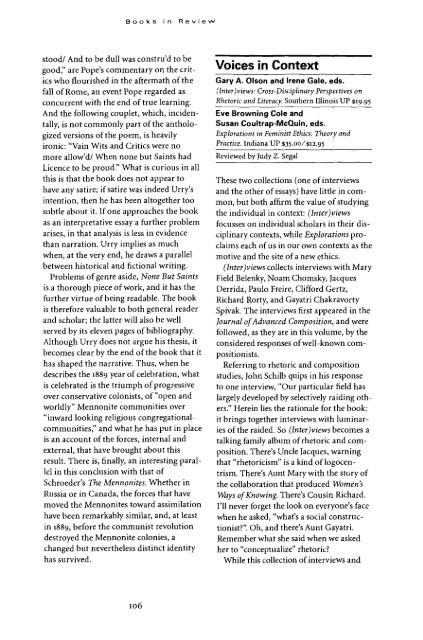To All Appearances A Lady - University of British Columbia
To All Appearances A Lady - University of British Columbia
To All Appearances A Lady - University of British Columbia
Create successful ePaper yourself
Turn your PDF publications into a flip-book with our unique Google optimized e-Paper software.
Books in Review<br />
stood/ And to be dull was constru'd to be<br />
good," are Pope's commentary on the critics<br />
who flourished in the aftermath <strong>of</strong> the<br />
fall <strong>of</strong> Rome, an event Pope regarded as<br />
concurrent with the end <strong>of</strong> true learning.<br />
And the following couplet, which, incidentally,<br />
is not commonly part <strong>of</strong> the anthologized<br />
versions <strong>of</strong> the poem, is heavily<br />
ironic: "Vain Wits and Critics were no<br />
more allow'd/ When none but Saints had<br />
Licence to be proud." What is curious in all<br />
this is that the book does not appear to<br />
have any satire; if satire was indeed Urry's<br />
intention, then he has been altogether too<br />
subtle about it. If one approaches the book<br />
as an interpretative essay a further problem<br />
arises, in that analysis is less in evidence<br />
than narration. Urry implies as much<br />
when, at the very end, he draws a parallel<br />
between historical and fictional writing.<br />
Problems <strong>of</strong> genre aside, None But Saints<br />
is a thorough piece <strong>of</strong> work, and it has the<br />
further virtue <strong>of</strong> being readable. The book<br />
is therefore valuable to both general reader<br />
and scholar; the latter will also be well<br />
served by its eleven pages <strong>of</strong> bibliography.<br />
Although Urry does not argue his thesis, it<br />
becomes clear by the end <strong>of</strong> the book that it<br />
has shaped the narrative. Thus, when he<br />
describes the 1889 year <strong>of</strong> celebration, what<br />
is celebrated is the triumph <strong>of</strong> progressive<br />
over conservative colonists, <strong>of</strong> "open and<br />
worldly" Mennonite communities over<br />
"inward looking religious congregationalcommunities,"<br />
and what he has put in place<br />
is an account <strong>of</strong> the forces, internal and<br />
external, that have brought about this<br />
result. There is, finally, an interesting parallel<br />
in this conclusion with that <strong>of</strong><br />
Schroeder's The Mennonites. Whether in<br />
Russia or in Canada, the forces that have<br />
moved the Mennonites toward assimilation<br />
have been remarkably similar, and, at least<br />
in 1889, before the communist revolution<br />
destroyed the Mennonite colonies, a<br />
changed but nevertheless distinct identity<br />
has survived.<br />
Voices in Context<br />
Gary A. Olson and Irene Gale, eds.<br />
(Inter)views: Cross-Disciplinary Perspectives on<br />
Rhetoric and Literacy. Southern Illinois UP $19.95<br />
Eve Browning Cole and<br />
Susan Coultrap-McQuin, eds.<br />
Explorations in Feminist Ethics: Theory and<br />
Practice. Indiana UP $35.00/512.95<br />
Reviewed by Judy Z. Segal<br />
These two collections (one <strong>of</strong> interviews<br />
and the other <strong>of</strong> essays) have little in common,<br />
but both affirm the value <strong>of</strong> studying<br />
the individual in context: (Inter)views<br />
focusses on individual scholars in their disciplinary<br />
contexts, while Explorations proclaims<br />
each <strong>of</strong> us in our own contexts as the<br />
motive and the site <strong>of</strong> a new ethics.<br />
(Inter)views collects interviews with Mary<br />
Field Belenky, Noam Chomsky, Jacques<br />
Derrida, Paulo Freire, Clifford Gertz,<br />
Richard Rorty, and Gayatri Chakravorty<br />
Spivak. The interviews first appeared in the<br />
Journal <strong>of</strong> Advanced Composition, and were<br />
followed, as they are in this volume, by the<br />
considered responses <strong>of</strong> well-known compositionists.<br />
Referring to rhetoric and composition<br />
studies, John Schilb quips in his response<br />
to one interview, "Our particular field has<br />
largely developed by selectively raiding others."<br />
Herein lies the rationale for the book:<br />
it brings together interviews with luminaries<br />
<strong>of</strong> the raided. So (Inter)views becomes a<br />
talking family album <strong>of</strong> rhetoric and composition.<br />
There's Uncle Jacques, warning<br />
that "rhetoricism" is a kind <strong>of</strong> logocentrism.<br />
There's Aunt Mary with the story <strong>of</strong><br />
the collaboration that produced Women's<br />
Ways <strong>of</strong> Knowing. There's Cousin Richard.<br />
I'll never forget the look on everyone's face<br />
when he asked, "what's a social constructionist?".<br />
Oh, and there's Aunt Gayatri.<br />
Remember what she said when we asked<br />
her to "conceptualize" rhetoric?<br />
While this collection <strong>of</strong> interviews and<br />
106

















